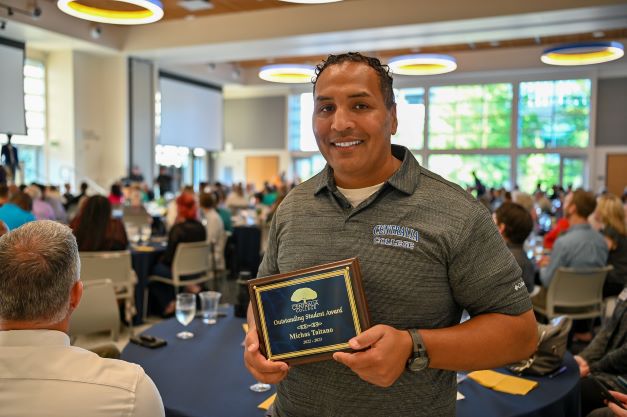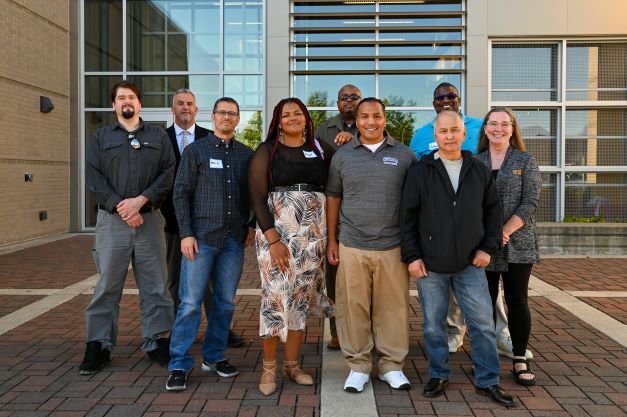Incarcerated Students Triumph
June 22, 2023
By Lukas D'Ambrosio (email) Communications Office
Michas Taitano holding his Outstanding Student Award at his graduation from Centralia College. (Photo courtesy of Brendan Baptiste, Communications Office)
This month, a wave of celebration is sweeping across correctional facilities in Washington State as incarcerated individuals proudly don their caps and gowns to mark their college graduations. In a remarkable display of determination and resilience, these graduates have overcome countless obstacles to earn their degrees behind bars. From Walla Walla to Monroe, college education programs have equipped these individuals with knowledge, skills, and a renewed sense of purpose. With their achievements, these graduates inspire hope and showcase the transformative power of education, emphasizing the importance of providing opportunities for personal growth and rehabilitation within the prison system.
“These individuals truly embody what we are trying to accomplish here at DOC,” said Secretary Cheryl Strange. “We are always striving for our incarcerated to return to society as better neighbors and these individuals have worked hard to accomplish something that has been shown to better people’s lives and set them up for success in the future,” said Strange.
One such individual, Michas Taitano, an incarcerated individual at Cedar Creek Correctional Center (CCCC), defied the odds and was honored with the prestigious 2022-2023 Outstanding Student Award at Centralia College. The award, which recognizes students who have overcome significant obstacles in their pursuit of education while demonstrating exceptional commitment to their studies and college community, solidifies Taitano’s remarkable achievements.
Despite the challenges of pursuing higher education while incarcerated, Taitano’s determination and dedication shone through. Nominated by faculty and chosen by a selection committee, his exceptional academic performance and unwavering commitment to personal growth made him a deserving recipient of this esteemed accolade.
Taitano’s journey towards success was marked by resilience and perseverance. He navigated a complex web of obstacles, including the limitations of prison life, to achieve his educational goals. Through unwavering focus and relentless pursuit of knowledge, Taitano demonstrated that the walls of a correctional facility can be used to better oneself.
To mark this significant achievement, Taitano was granted special permission to attend his graduation through an escorted leave facilitated by Cedar Creek Correctional Center staff. With anticipation and excitement, he attended the award ceremony and graduation in person, where he received his accolade in front of faculty, and loved ones. This rare opportunity not only acknowledged Taitano’s exceptional achievements but also served as a poignant reminder of the transformative power of education.
“We are so happy for Michas to receive such a prestigious award and that he and his hard work gets to be recognized and celebrated,” said Strange.
In an era where the focus on rehabilitation and reducing recidivism rates has taken center stage, the immense value of offering college degree programs to incarcerated individuals are being recognized exponentially. These programs not only reshape lives but also redefine the possibilities for success upon release.
One of the most significant advantages of pursuing a college degree in prison is the profound impact it has on an individual’s self-confidence. As these individuals engage in rigorous academic pursuits, they rediscover their intellectual capabilities and gain a renewed sense of purpose. The process of acquiring knowledge, engaging in critical thinking, and achieving academic milestones empowers them to believe in their own potential, instilling a newfound confidence that transcends the prison walls.
Obtaining a college degree in prison equips individuals with a diverse and marketable skill set. Through specialized coursework and vocational training, incarcerated students acquire valuable expertise that is applicable to real-world employment opportunities. This acquisition of practical skills significantly enhances their prospects for meaningful employment upon release, enabling them to contribute positively to society. By equipping them with the tools they need to secure stable jobs, college degree programs in prisons serve as steppingstones to economic independence and a successful reintegration into the community.
Beyond the educational benefits, these programs foster a supportive environment that nurtures personal growth and transformation. Individuals enrolled in college courses form bonds with fellow students, educators, and mentors, creating a network of support that extends far beyond graduation. Through collaboration, peer feedback, and mentorship, incarcerated individuals develop essential social skills, empathy, and resilience. This sense of community provides the emotional and psychological support needed to overcome the challenges of prison life as well as life on the outside and lays a foundation for a successful transition back into society.
“We truly believe that education is a proven and strong pathway to success for our incarcerated,” said Strange. “Whether that education be in a trade or in a classroom, it sets them up for opportunities that they may never have had access to.”
Graduation ceremonies have taken place across the state at facilities like WSP, MCC and CCCC to celebrate these individuals hard work and determination.
Graduation ceremonies have taken place across the state at facilities like Washington State Penitentiary (WSP), Monroe Correctional Complex (MCC) and Cedar Creek Corrections Center (CCCC) to celebrate these individuals' hard work and determination.

